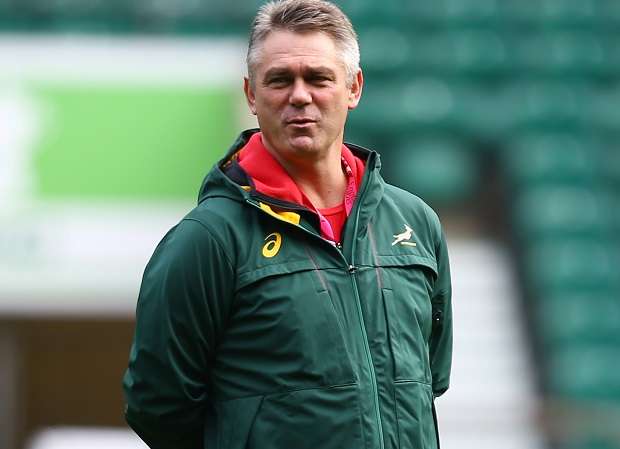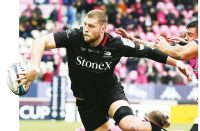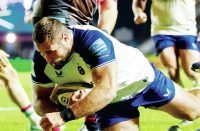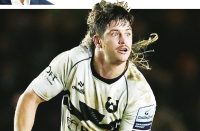 Mike Ford said throughout the season that he was meeting with Bath’s owner, Bruce Craig, on a weekly basis, and that everyone on the playing side recognised the need for improvement. Ford said after Bath finished in ninth place in the Premiership that he understood the consequences of having another underperforming season in 2016-17.
Mike Ford said throughout the season that he was meeting with Bath’s owner, Bruce Craig, on a weekly basis, and that everyone on the playing side recognised the need for improvement. Ford said after Bath finished in ninth place in the Premiership that he understood the consequences of having another underperforming season in 2016-17.
However, although most people – including Ford – thought that he would be staying on as head coach, Craig and his managing director, Tarquin McDonald, decided his time was up, and his departure from the Rec was announced earlier this week. This followed an internal review that must have brought new or old information into focus, making Mike Ford’s position untenable.
Premiership rugby is a results-driven business, and the telling point for me was when Mike said towards the end of the season that he should have re-booted the tactical plan at the start of the campaign, and done things differently. Instead, the team didn’t progress, and the accountability for that rests with him as head coach.
One of his biggest problems was that the front five was not as competitive this season as it was last, when it seemed as if the top ten forwards in the Bath squad could rotate and the performance of the pack did not suffer. That was not the case this time, and Bath learnt the hard way that if you don’t have a powerful, aggressive, physical presence in the front five then you are likely to struggle.
The same applies if you are penalty magnets. Bath lacked discipline throughout the league campaign, and were punished by opponents regularly as a result. Players have to know the line between risk and reward, and it is up to the head coach to instil that. It was something that was lacking, and the communication between the coach and his players didn’t seem to be there.
The Bath midfield also became much too predictable, with George Ford, Kyle Eastmond and Jonathan Joseph unable to carve out the space they enjoyed the season before. What they needed was a midfield option of a runner to take it flat, hard, and straight at the opposition. You need that variation. Although, if you’re smart, you can use big, powerful wings like Semesa Rokoduguni and Matt Banahan up the middle, it is not fully effective if, at the same time, you lose strike power out wide.
Mike Ford got those options wrong, but there’s no disgrace in that. He’s learning the head coach trade, and everyone at Bath knows that he did his best to turn things round. I liked some of his touches, such as putting the Roman numerals 25 on the match shirt as a points target for every match.
The reality is that the ambition did not match the execution, and the season seemed to hinge on their European Cup pool matches against Wasps, with Bath winning at the Ricoh only to get thumped at the Rec.
Whereas you wanted to watch Bath because of their style and entertainment during the 2014-15 season, this time there wasn’t the same energy.
When a team gets into the losing habit it is very difficult to turn it around. It takes an inspirational coach and a group of very hard-working players to do that – and somewhere there was a disconnect between Mike and his squad, because it didn’t happen.
The players in the Bath squad have to take responsibility, too. There were very few guys who played consistently well, and they cannot use the World Cup as an excuse. Good teams don’t have excuses – they have answers. Anthony Watson, Joseph, and George Ford came back from the disappointment of the World Cup, and then the high of winning a Grand Slam with England, but they didn’t seem to adjust when they were back with the club in the way the Saracens players did. The same was true of François Louw.
It’s not great that the turnover in coaches at Bath has been three in five seasons, with Ian McGeechan, Gary Gold, and now Ford moving on. It’s never an easy job, and I feel for top coaches. Essentially, you’ve got three seasons to get it right once you take on a new job. In the first you inherit a side, in the second you start to build a side and in the third, if you’ve got a big budget and resources, you’ve got to be in a top four place in the league, or the very least a top six.
That means about eight months only in which to produce a quality squad – and if you don’t make it the Grim Reaper is there swinging his scythe.
It will be interesting to see who will replace Mike Ford. For me, Bath’s style is about hard, fast attacking rugby, but also about being smart enough to play the conditions. I’d like to see Pat Lam, Gregor Townsend or Dean Richards mentioned as head coach candidates. I’d be much less happy if it was former Springbok coaches Jake White or Heyneke Meyer, because their way is not the Bath way.
Bath have gone the South African route before with Gold, and it didn’t work. He went, and now Mike has gone – but for different reasons. Mike tried the Bath way, but couldn’t nail it. You have to be clever enough to upgrade your package each season – and, under Mike, Bath didn’t do that.
Dean Richards has done most things right at Leicester, Harlequins, and now Newcastle. He’s a no-nonsense Englishman with a hard-nosed outlook, and he knows that you need to build a fearsome forward pack as your first objective if you want a sustainable attacking style. Gregor Townsend has brought a really stylish Bath-like approach to the way Glasgow play, while Pat Lam has transformed Connacht into Pro12 contenders.
Bath have not been the Premiership’s only underperformers. Jim Mallinder’s Northampton have not had a great season given their squad strength, and it is strange that a player like Samu Manoa moving on seems to have made such a difference.
You could argue that Bath had similar disruption with Carl Fearns leaving for Lyon, Paul James returning to the Ospreys and, of course, with Sam Burgess also heading for the exit after the World Cup. Maybe they are part of the reason for Bath’s slide, but they are nowhere near the whole reason.
The reality is that Bath’s best players did not play consistently well, and my speculation is that maybe they didn’t agree wholly with Mike. However, they also didn’t tell him forcefully enough to make sure that they were heard. Were they mature enough? We don’t know for sure, but what we do know is that there was a disconnect, and player performances were way below their best on far too many occasions.
Sure, they did well in Toulon, but there were too many occasions where they couldn’t get it together. Psychologically they weren’t strong enough. If you don’t think you’re playing the right way, then play the right way. If your messages aren’t getting through, then make sure they do.
It’s when it gets tough that you find out who your senior players are – those who can lead you through. There were very few of those at Bath last season, and that’s why there is much more hard work to be done.
Saracens, Wasps and Exeter look at least ten to 15 per cent fitter and fresher than most of the other nine Premiership sides, including Bath. A good culture is infectious, but there shouldn’t be that level of difference between the pace-setters and the rest of the league.
My question is why aren’t Bath the fittest side in the league? This Bath side has to find its own identity. Exeter have it, Wasps have it, and Saracens have it. Bath need to rediscover it, and anyone of the three coaches I’ve mentioned above would go a long way to developing that culture.























